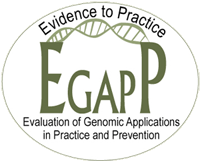About EGAPP
This website is archived for historical purposes and is no longer being maintained or updated.
Evaluation of Genomic Applications in Practice and Prevention (EGAPP): Implementation and Evaluation of a Model Approach
 The EGAPP initiative was launched by the CDC Office of Public Health Genomics in the fall of 2004. The initiative’s goal is to establish and evaluate a systematic, evidence-based process for assessing genetic tests and other applications of genomic technology in transition from research to clinical and public health practice. EGAPP also aims to integrate:
The EGAPP initiative was launched by the CDC Office of Public Health Genomics in the fall of 2004. The initiative’s goal is to establish and evaluate a systematic, evidence-based process for assessing genetic tests and other applications of genomic technology in transition from research to clinical and public health practice. EGAPP also aims to integrate:
- existing recommendations on implementation of genetic tests from professional organizations and advisory committees.1,2,3,4
- knowledge and experience gained from existing processes for evaluation and appraisal (e.g., US Preventive Services Task Force, CDC’s Task Force on Community Preventive Services), previous CDC initiatives (e.g., the ACCE process for assembling and analyzing data on genetic tests 5, and the international health technology assessment experience.
Why is genetic testing a public health issue?
The success of the Human Genome Project has led to increasingly rapid translation of genomic information into clinical applications. Genetic tests for more than 2,000 diseases have been developed, with more than 1,000 currently available for clinical testing. Most are used for diagnosis of rare genetic disorders, but a growing number have population-based applications, including carrier identification, predictive testing for inherited risk of common diseases, and pharmacogenetic testing for variation in drug response. These tests and other anticipated applications of genomic technologies for screening and prevention have the potential for broad public health impact.
In recent years, a number of issues have been raised about the current status of genetic testing implementation and oversight, including the need to develop evidence to establish efficacy and cost-effectiveness before tests are commercialized.1-12 In addition, as new genomic technologies with potential applications in clinical practice continue to become available, there is an increasingly urgent need for timely and reliable information that will allow health care providers and payers, consumers, and policy makers to distinguish tests that are safe and useful. Recommendations on the development and implementation of safe and effective genetic tests have been produced by expert panels, professional organizations, and clinical experts, including the National Institutes of Health – Department of Energy Task Force on Genetic Testing, the former Secretary’s Advisory Committee on Genetic Testing, and the Secretary’s Advisory Committee on Genetics, Health and Society. However, a coordinated approach for effectively translating genomic applications into clinical practice and health policy is still needed.
References
- Holtzman NA, Watson MS. Promoting Safe and Effective Genetic Testing in the United States. Final Report of the National Institute of Health – Department of Energy (DOE) Task Force on Genetic Testing, 1997.
- Enhancing the Oversight of Genetic Tests: Recommendations of the Secretary’s Advisory Committee on Genetic Testing, 2001.
- Secretary’s Advisory Committee on Genetic Testing: A Public Consultation on Oversight of Genetic Tests, January 2001.
- Coverage and Reimbursement of Genetic Tests and Services. Report of the Secretary’s Advisory Committee on Genetics, Health, and Society, February, 2006.
- Haddow JE, Palomaki GE: ACCE: A Model Process for Evaluating Data on Emerging Genetic Tests. In: Human Genome Epidemiology: A Scientific Foundation for Using Genetic Information to Improve Health and Prevent Disease. Khoury M, Little J, Burke W (eds.), Oxford University Press, pp. 217-233, 2003
- Burke W, Atkins D, Gwinn M, Guttmacher A, Haddow J, Lau J, Palomaki G, Press N, Richards CS, Wideroff L, Wiesner GL. Genetic Test Evaluation: Information Needs of Clinicians, Policy Makers, and the Public. Am J Epidemiol 2002;156:311-318.
- Little J, Bradley L, Bray MS, Clyne M, Dorman J, Ellsworth DL, Hanson J, Khoury M, Lau J, O’Brien TR, Rothman N, Stroup D, Taioli E, Thomas D, Vainio H, Wacholder S, Weinberg C. Reporting, appraising, and integrating data on genotype prevalence and gene-disease associations. Am J Epidemiol. 2002;156:300-310.
- Haga SB, Khoury MJ, Burke W. Genomic profiling to promote a healthy lifestyle: not ready for prime time. Nat Genet. 2003;34:347-50.
- Hudson KL. Genetic testing oversight. Science. 2006;313:1853.
- Hudson KL, Murphy JA, Kaufman DJ, Javitt GH, Katsanis SH, Scott J. Oversight of US genetic testing laboratories. Nat Biotechnol. 2006;24:1083-1090.
- Javitt GH. Policy implications of genetic testing: not just for geneticists anymore. Adv Chronic Kidney Dis. 2006;13:178-182
- Government Accountability Office, Nutrigenetic Testing: Tests purchased from Four web sites Mislead Consumers; [PDF 621KB] accessed January 18, 2007
- Page last reviewed: December 6, 2016 (archived document)
- Content Source:


 ShareCompartir
ShareCompartir